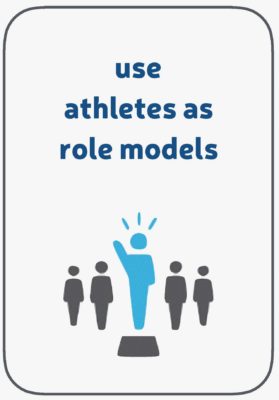Use athletes as role models

A “role model” is defined as a prominent person whose behavior, habits or accomplishments are copied by others. The term “role model” was developed in the 1940’s by American Sociologist, Robert K. Merton. Merton developed this concept through focus group research that showed that everyday people often compare themselves with notable, public figures when evaluating their own attitudes and values.
‘Every kid in the world who plays football wants to be Pele which means I have the responsibility of showing them how to be a footballer but also how to be a man’ (FIFA).
Sports will become a powerful platforms for change, providing global stages for positive inspiration for fans and the rest of society. For instance, 66% think athletes are role models in society (Canvas). With such huge reach, sports provide the biggest platform for positive change. Research shows that fans not only see sporters as role models in sport, but in life generally, and they consider personality to be more important than skill (Canvas).
Case studies
- Higgs
- VOGO
- Syncy
- Super Live center
- Hawk-Eye
- Nmodes
- EyeCandyLab
- Live Arena
- Live Tube
- SciSports
- AVEX
- Foot Analytics
- WizzyMaps
- Bitz
- Ixpole
- Oveit FacePay
- StayFilm
- Snaptivity
- Texel
Literature
Canvas8 and Performance Communications. The future of sports Fans. 2016 https://www.fotball.no/globalassets/dommer/the-future-sports-fan_spilleregler_english.pdf
FIFA.com (2018) “The King of Football.” Accessed 20 February 2018. https://www.fifa.com/fifa-tournaments/players-coaches/people=63869/profile.html
Merton, Robert King. 1936. The Unanticipated Consequences of Purposive Social Action. https://www.semanticscholar.org/paper/The-Unanticipated-Consequences-of-Purposive-Social-Merton/e74436ff05f16d3c3c11044e19618a24472270f9
